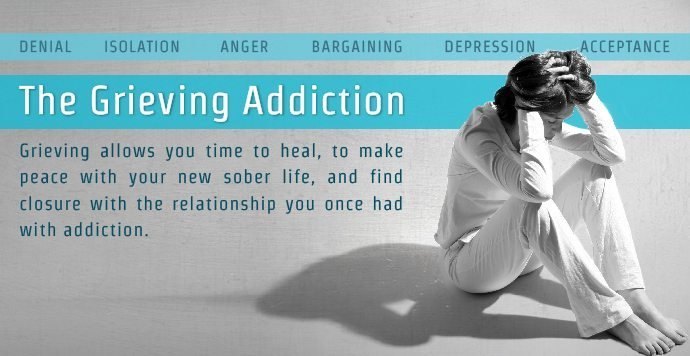The Grieving Addiction

When you hear about grief or even just the word, what do you think of? Like so many others, your mind probably immediately started thinking of losing a loved one that has passed away. In history, grief has been strongly linked to death and other severely traumatic experiences.
But what is grief? Grief is typically defined as a multifaceted response to the loss of someone or something to which a bond has formed. Grief can last from minutes to many years. It all depends on the person, place, and things involved. When we experience grief, we each feel it at different stages and different intensities.
It is said that there are at least five stages of grief. You may not go through all of them or you may get stuck on one of them. It is safe to say we do not experience grief the same way as anyone else. Similar to grieving death, we grieve the loss of many other things. For example, we grieve the loss of animals, jobs, houses, money, and even addictions.
The last point might be surprising to many, but to anyone who has suffered with an addiction, it probably sounds right. When we have an addiction, it is something that we build a lasting and intimate relationship with because it helps us cope with the struggles of everyday life. It becomes our “safe zone,” similar to family and friends. This addiction is something that has formed over many years, so we have developed a strong committed relationship with it.
In a sense we have become co-dependent on it. Co-dependency is defined by the Oxford Dictionary as an “excessive emotional or psychological reliance on a partner.” In this situation, the “partner” would be the addiction. We might feel that we can’t live without it and may be the reason many struggle to end their addiction relationship.
When an individual has decided to end the relationship with their addiction, a certain level of grief may be experienced. As mentioned above grief happens typically in stages, which include: denial or isolation, anger, bargaining, depression, and acceptance.
These stages are described in detail below. Keep in mind some individuals may go through all of these in sequential order and some may experience them in any order.
Denial Or Isolation
The first step in grief is usually denial. At this stage, an individual will deny that they have an addiction or that even the smallest problem exists, and will likely deny that they need treatment and recovery. No problem equals no treatment needed. Feeling the loss of the addiction is something that they can’t handle, so they keep it a secret, isolate from others, and deny it’s even there.
Anger
Sometimes they will get angry with the whole situation, angry about the causes of the addiction, angry at people that are involved, and just plain angry at everything. Facing reality when sober is a difficult situation. When giving up your addiction, dealing with life makes you angry. You may also feel angry that you are being forced to give up something that you feel is so important to your life.
Bargaining
Bargaining is the act of trying to regain control over the situation in a way that allows you to continue using. Often it is with a higher power as you look for help to continue “controlled” drinking or drug using while living a “normal” life. This behavior or bargaining will continue, possible into the beginning of recovery as you try to find the magic key to use and function normally.
Depression
As the person in recovery becomes separated from their substance, they may feel levels of hopelessness. Some will fear what the future will hold, which will help put them deeper into depression. It is important to remember that this part of grief will not last forever. Attending support groups, seeking professional help, and getting sponsors with whom you can be open and honest with about your feelings will help you progress through this stage.
Acceptance
Passing through all those stages is difficult, but it can often lead to acceptance, the stage that all hope to obtain. In this stage, you will be able to accept your addiction and will be willing to get help. You will come to terms with the fact that they you never be able to use again and will no longer fight with yourself and others about that fact. In this stage, you are learning to live peacefully and fill your life with positive support and activities that create a positive healthy life without alcohol.
When struggling with an addiction, it is important to seek support so you do not have to struggle alone. In addition to having a positive support system, it is just as important to be mindful of your emotions and feelings. Being content with what you are feeling and being open and honest about those feelings. Give yourself time to work through the emotion and space to deal with them.
Feeling grief and sadness are normal feelings to have when giving up an addiction, as it is the death of a relationship which may have felt beneficial to your life. Grieving the close personal relationship you had with it, like you have lost a dear friend or family member, is normal. Understanding the nature of this grieving allows you to grieve and heal to make peace with your new sober life and find closure with the close relationship you had with addiction.




